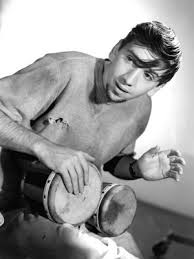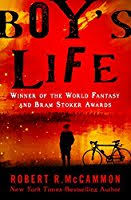We of a certain age tend to wax nostalgic about those fabulous 60s. What, you don’t remember those fabulous 60s? Well, that’s because you’re not of a certain age or, as the old joke goes, you did the 60s right. Authors of a certain age write wistfully pleasant stories about growing up back then, such as Ray Bradbury’s Something Wicked This Way Comes, Stephen King’s “The Body,” and presented for your consideration, Robert McCammon’s Boy’s Life.
Set in a small Alabama town in the late 50’s through early 60s, Boy’s Life is a murder mystery and a horror novel and a YA wizard story and To Kill a Mockingbird and you would think wrapping all that into one novel wouldn’t work but, surprise, it does. That’s because all of those are mere elements of the bigger story, which is coming of age in a time when America went from its best to its worst. Oh yeah, I’m telling you, that time period was the best. I’m sorry most of you didn’t get to experience it; instead, you get this sneering, leering mediocrity we call modern times and think because you’ve got the internet that you’ve got it all. You don’t. You missed it. People of a certain age are writing these golden-hazed novels in an attempt to explain and describe what you missed. My upcoming Frank Vaughn trilogy (WARNING!!! SHAMELESS SELF-PROMOTION AHEAD!!!) … Frank Vaughn Killed by his Mom, Southern Gothic, and Looking for Don…is my own poor effort, although you’ll see that my 60s weren’t all that golden-hazed.
Anyways, McCammon’s protagonist is 11-year-old Cory living in the small town of Zephyr, Alabama (a geographically challenged location because it is outside Robbins AFB, which was actually in Georgia). At about oh-dark-thirty one morning, he’s accompanying his father on a milkman route (yep, it’s early enough in the 60s for there to be milkmen) when a car zooms across the front of them and plunges into a bottomless lake. Cory’s Dad jumps in to save the driver because that’s what the stalwart men of the 60s (and all the men of the 60s were stalwart. Except Maynard) 
did and finds a guy handcuffed to the steering wheel with piano wire wrapped around his neck so already dead and it’s a murder and a whodunit…and herein arises the first of several annoying plot points because Cory sees what could be the murderer standing by the side of the road watching the attempted rescue, and later finds an important clue at the same spot and doesn’t bother telling anybody about it. Really? What self-respecting 11-year old wouldn’t be pulling on Dad’s lake-soaked shirt and going, “Uh, Dad…”
Cory enters a short story contest put on by the town library and writes about the murder, including details of what he saw, and reads it aloud to, oh, everybody in town, thereby revealing to the Sheriff and Dad and, heck, the world that he’d withheld important information. That should righteously PO both Sheriff and Dad, but no. I guess Dad is too stalwart a guy to get mad at his son for committing a minor felony like obstruction, and the Sheriff turns out to be crooked anyway so discount him. Everyone else in town? They’re like, “Fancy that, the kid withheld important information. Guess I’ll get some coffee.” Even the murderer, who becomes apparent about halfway through the story despite gigantic red herrings tossed by the bucket load in your face, makes nothing of it. Like I said, annoying plot points.
There is a river monster that everybody believes in until Cory and a witness see it and then no one believes it exists anymore, which is just odd; a triceratops that no one knew was a triceratops rampaging the countryside; a dog a la Pet Sematary; a rather obvious racist bombing plot; a voodoo priestess, a voodoo priest, and Cory and his pals sprouting wings and flying around. That about covers all the remaining plot points thrown willy and nilly to move things along and, you know, so what? ‘Cause that ain’t what this is about. Plot, I mean.
It’s about what you missed.
Go into this book with that in mind and it becomes something different: a portrait, and a pretty good one. I, too, lived for a time during the 60’s in a small Alabama town and I gotta say, McCammon nails the zeitgeist. Like Zephyr, my town had a local slattern running a house of ill repute, a local group of moonshiners, casual racism, a local rich eccentric, a local monster known as the Cryman soon to be (WARNING!!! SHAMELESS SELF-PROMOTION AHEAD!!!) novelized by yours truly, and ghost hot rods disappearing in the mists. I rode my bike like Cory did, hither and yon across fields and dusty roads from dawn to well past dusk with nary a parental concern, cruised woods and swamps and rivers in the company of pals, ran from bullies, sang and danced to the ever burgeoning catalogue of new bands like the Beach Boys and the Rolling Stones, and collected Famous Monsters and it was all safe, all wonderful, all magic. And don’t give me that rich white privilege BS. We weren’t rich, and lots of unwhite boys shared the same experiences. It was the time. You missed it.
I wish you hadn’t.
